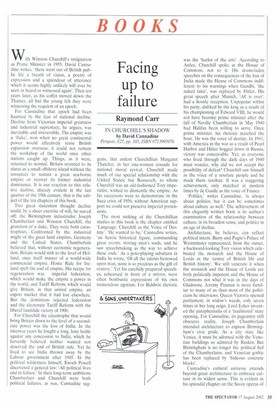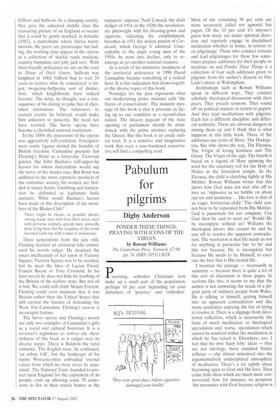Facing up to failure
Raymond Carr
IN CHURCHILL'S SHADOW by David Cannadine Penguin, £25, pp. 385, ISBN 0713995076 With Winston Churchill's resignation as Prime Minister in 1955, David Cannadine writes, 'there went out of British public life a breath of vision, a poetry of expression and a splendour of utterance which it seems highly unlikely will ever be seen or heard or witnessed again'. Then ten years later, as his coffin moved down the Thames. all but the young felt they were witnessing the requiem of an epoch.
For Cannadine that epoch had been haunted by the fear of national decline. Decline from Victorian imperial greatness and industrial supremacy, he argues, was inevitable and irreversible. The empire was a 'fluke', won when no great continental power would effectively resist British expansion overseas: it could not remain the workshop of the world once other nations caught up. Things, as it were, returned to normal. Britain reverted to its status as a small offshore island without the resources to sustain a great sea-borne empire or recover its former industrial dominance. It is our reaction to this relative decline, already evident in the last quarter of the 19th century, that is the subject of the ten chapters of this book.
Two great statesmen thought decline could, by a sheer exercise of will, be staved off: the Birmingham industrialist Joseph Chamberlain and Winston Churchill, the grandson of a duke. They were both catastrophists. Confronted by the industrial might of the great land empires, Germany and the United States, Chamberlain believed that, without economic regeneration, Britain would sink to the level of Holland, once itself master of a world-wide commercial empire. Home Rule for Ireland spelt the end of empire. His recipe for regeneration was imperial federation, which would make the empire a power in the world, and Tariff Reform, which would give Britain, in that united empire, an export market that it had lost elsewhere. But the dominions rejected federation and the electorate Tariff Reform with the liberal landslide victory of 1906.
For Churchill the catastrophe that would bring Britain down to the level of a secondrate power was the loss of India. In the interwar years he fought a long, lone battle against any concession to India, which he fervently believed neither wanted nor deserved the end of British rule. Yet he lived to see India thrown away by the Labour government after 1945. In the political wilderness himself, Enoch Powell discovered a general law: 'All political lives end in failure.' In their long-term ambitions Chamberlain and Churchill were both political failures, as was, Cannadine sug gests, that ardent Churchillian Margaret Thatcher, in her one-woman crusade for national moral revival. Churchill made much of our special relationship with the United States; but Roosevelt, to whom Churchill was an old-fashioned Tory imperialist. wished to dismantle the empire. As his successors were to demonstrate in the Suez crisis of 1956, without American support we could not preserve imperial pretensions.
The most striking of the Churchillian studies in this book is the chapter entitled 'Language: Churchill as the Voice of Destiny'. 'He wanted to be,' Cannadine writes, 'an heroic historical figure, commanding great events, stirring men's souls, and he saw speechmaking as the way to achieve these ends.' As a polo-playing subaltern in India he wrote, 'Of all the talents bestowed upon man, none is so precious as the gift of oratory.' Yet his carefully prepared speeches, rehearsed in front of a mirror, were often bombastic expressions of his own tremendous egotism. For Baldwin rhetoric was the 'harlot of the arts'. According to Attlee. Churchill spoke at the House of Commons, not to it. His doom-laden speeches on the consequences of the loss of India made the House of Commons indifferent to his warnings when Gandhi, 'the naked fakir', was replaced by Hitler. His great speech after Munich, 'All is over', had a hostile reception. Unpopular within his party, disliked by the king as a result of his championing of Edward VIII, he would not have become prime minister after the fall of Neville Chamberlain in May 1940 had Halifax been willing to serve. Once prime minister, his rhetoric matched the hour. He was the voice of destiny. In 1941. with America in the war as a result of Pearl Harbor and Hitler bogged down in Russia, victory was conceivable. Yet, as everyone who lived through the dark days of 1940 must wonder, why did we not accept the possibility of defeat? Churchill saw himself as the voice of a resolute people and he made them resolute. It was a staggering achievement, only matched in modern times by de Gaulle as the voice of France.
'Politics,' writes Cannadine, Is always about politics; but it can be sometimes about culture as well.' The achievement of this elegantly written book is its author's examination of the relationship between culture, in its broadest sense, and politics in an age of decline.
Architecture, he believes, can reflect political intent. Barry and Pugin's Palace of Westminster represented, from the outset, a backward-looking Tory vision which celebrated the monarch and the House of Lords as the 'centre of British life and British history'. We still venerate it when the monarch and the House of Lords are both politically impotent and the House of Commons not what it was in the days of Gladstone. Jeremy Paxman is more familiar to many of us than most of the politicians he interviews. Queen Victoria opened parliament, in widow's weeds, only seven times in her long reign. Lord Esher invented the paraphernalia of a 'traditional' state opening. For Cannadine, its pageantry still obscures reality. Joseph Chamberlain intended architecture to express Birmingham's civic pride. As a city state like Venice, it must be adorned with the Venetian buildings so admired by Ruskin. But Birmingham is no longer the political fief of the Chamberlains, and Venetian gothic has been replaced by 'hideous concrete blocks'.
Cannadine's cultural universe extends beyond great architecture to embrace culture in its widest sense. This is evident in his splendid chapter on the Savoy operas of Gilbert and Sullivan. In a changing society, they gave the educated middle class the reassuring picture of an England so secure that it could be gently mocked; in lolanthe (1882), a pantomime where fairies marry mortals, the peers are picturesque but fading; the working class appear in the operas as a collection of 'dutiful rustic maidens, country bumpkins and jolly jack tars'. With their friendly policemen we are on the road to Dixon of Dock Green. Sullivan was knighted in 1883: Gilbert had to wait 24 years to receive what he considered 'a tinpot, twopenny-halfpenny sort of distinction', which knighthoods have indeed become. The delay, he thought, was a consequence of his daring to poke fun at cherished institutions. The references to current events, he believed, would make him unknown to posterity. He need not have worried. The Savoy operas have become a cherished national institution.
In the 1880s the patriotism of the operas was aggressively self-confident. Foreigners were comic figures denied the benefits of British freedom. Cannadine presents Ian Fleming's Bond as a latter-day Victorian patriot, like John Buchan's stiff-upper-lip heroes for whom materialism would sap the nerve of the master race. But Bond was addicted to the more expensive products of the consumer society; his women are bedded in luxury hotels. Gambling and fornication he defended as legitimate basic instincts. What would Buchan's heroes have made of this description of the members of the Blades Club?
There might he cheats, or possible cheats, among them, men who beat their wives, men with perverse instincts, greedy men, cowardly men, lying men; but the elegance of the room invested each one with a kind of aristocracy.
Three generations from the jute mill, Fleming married an aristocrat who considered his novels vulgar. He despised the smart intellectuals of her salon in Victoria Square; Victoria Square was to be avoided, lest he meet the likes of Lucian Freud, Francis Bacon or Tony Crosland. In his later novels he does not hide his loathing of the Britain of the welfare state. But not all is lost. We could still climb Mount Everest; Fleming could even maintain that it was Britain rather than the United States that still carried the burden of defending the West. For Cannadine. Fleming's oeuvre is an escapist fantasy.
The Savoy operas and Fleming's novels are only two examples of Cannadine's gifts as a social and cultural historian. It is a reviewer's nightmare to convey the sheer richness of this book as it ranges over its diverse topics. There is Baldwin the rural romantic. The English were, he confessed, an urban folk', but the landscape of his native Worcestershire embodied 'eternal values from which we must never be separated'. The National Trust, founded to protect rural England for the enjoyment of its people, ends up allowing some 70 aristocrats to live in their stately homes at the
taxpayers' expense. Noel Coward, the draft dodger of 1914, in the 1920s the revolutionary playwright with his dressing-gown and cigarette, ridiculing the establishment, becomes in 1931 the ardent patriot of Cavalcade, which George V admired. Unacceptable to the angry young men of the 1950s, he went into decline, only to reemerge as yet another national treasure.
As a result of his dismissive treatment of the territorial aristocracy in 1990 David Cannadine became something of a radical hero. It is this radicalism that draws together the diverse topics of this book.
Nostalgia for the past represents what our modernising prime minister calls 'the forces of conservatism'. The insistent message of this book is that it prevents us facing up to our condition as a second-class nation. The illusory pageant of the state opening of parliament should be abandoned, with the prime minister replacing the Queen. But this book is no crude radical tract. It is a sensitive and imaginative work that even a case-hardened conservative will find a compelling read.































































 Previous page
Previous page